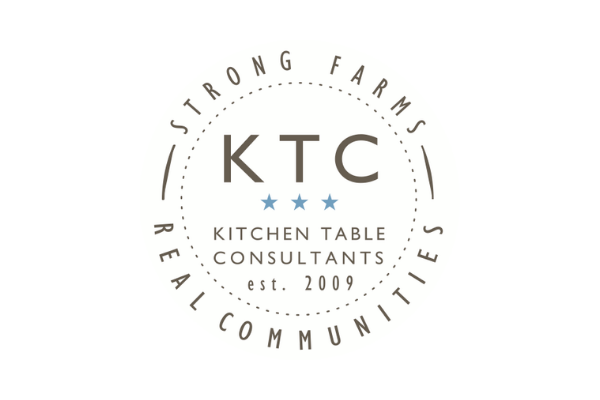Subscribe: Apple Podcasts | Spotify | Amazon Music | iHeartRadio | RSS | More
In Edible-Alpha® podcast #52, Tera interviews Ted LeBow and Jennifer Brodsky, co-founders and principals of Kitchen Table Consultants, a consulting firm that helps passionate farmers and food artisans build lasting, profitable, locally-focused businesses. The heart of their work is one-on-one coaching with food and farm clients, but as their work has grown they have started helping other organizations provide better technical assistance. They see entrepreneurship and entrepreneurial agriculture as essential to maintaining vibrant rural communities and addressing many challenges in the marketplace from climate variability to changing consumer preferences, though this is a mindset shift especially on the part of many conventional farmers.
Rather than just make plans or recommendations for clients, it is critically important to their firm’s mission and values that they “roll up their sleeves” alongside the clients to help them implement their recommendations. For example, one of Ted’s earliest clients was The Family Cow, a 6th generation farm that needed to better understand why they were loosing money so they could improve their business. With Ted and KTC’s help as a coach as well as in implementing a new financial system, they were able to get profitable and understand the financial drivers of their business. KTC has innovative arrangements with clients to provide the services of their diverse and talented staff in a way that shows their commitment to business success – for example, KTC took an equity position with a value-added co-packer in exchange for KTC staff providing consulting and ongoing staff support.
Ted and Jen often encourage nonprofits they work with in the food, farming and “food systems” space to imagine multiple paths that might achieve their mission rather than being focused on building food and farm businesses themselves. This is due to the difficulty of layering nonprofit missions on top of businesses (like food/farming businesses) that have low margins, and this is especially true if the nonprofit’s staff doesn’t have the background to properly support the business. They also encourage nonprofits to take advantage of their unique position to take risks in fulfilling their mission to support farmers/entrepreneurs, but it takes a mindset shift on the part of some nonprofit professionals.
Food Hubs have started to see grant funding dry up and have started to identify opportunities to work together (including a transactional network that KTC is working on) to become more efficient and reach their ideal scale. However, these businesses also seem to have choices to make regarding if they should build out what they do as an alternative supply chain or try to integrate with/add value to the current conventional supply chain. A big fundamental challenge for food hubs is some hubs’ exclusive focus of local food as an organizing principal without a plan for profitability when, for example, local products cannot be produced or the market is not big enough to sustain the business.
Ted and Jen would like KTC to continue to grow its number of consultants as well as the number of people they serve, continuing to focus on providing ongoing value to the client through unique partnerships and programs. Their team includes a mix of contractors and employees, but all KTC people get a great amount of autonomy in tackling clients and problems that they want to work on. They are excited about leveraging that great team to serve more food and farm entrepreneurs across the country.

